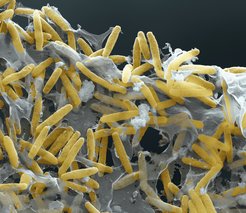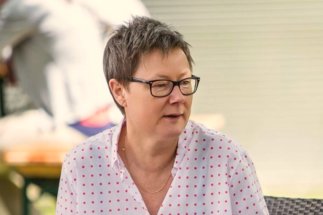Department of Ecophysiology

Bacterial cells process vast amounts of information to generate and regulate sophisticated output responses such as adaptation, differentiation, growth and cell movement in response to changes in the environment. Often, these output responses involve changes in gene expression, motility behavior and the cell cycle. In our research, we pursue two overall aims: Firstly, we aim to understand how bacteria sense and process information to generate appropriate output responses in response to changes in the environment. Secondly, we aim to understand how the molecular machines involved in motility, protein secretion and cell division function and how their activity is regulated.
Information processing is carried out by complex networks of signal transduction proteins. A challenging problem in biology is to understand how these protein networks are organized in space and time to allow the ordered execution of these tasks. Currently, we are probing bacterial information processing by studying signal transduction pathways and networks governing gene expression, motility, cell polarity, cell differentiation, development, and the cell cycle in Myxococcus xanthus. To understand how molecular machines function and their activity is regulated, we focus on molecular machines involved in cell motility, protein secretion and cell division in M. xanthus, Yersinia enterocolitica and Pseudomonas aeruginosa.
Currently the department consists of three research groups
- Dr. Andreas Diepold: Bacterial secretion systems (Research group leader) Until September 30th 2024; from October 1st 2024, professor for Applied Biosciences at Karlsruhe Institute for Technology
- Prof. Dr. Lotte Søgaard-Andersen: Bacterial adaptation & differentiation (Director)
- Dr. Anke Treuner-Lange: Structure, function & regulation of the Type IVa pilus machine (Project group leader)
Experimentally, we take an interdisciplinary approach to address our research questions and incorporate diverse techniques including:
- Molecular genetics
- Epifluorescence and high resolution microscopy as well as live-cell imaging
- In vitro characterization of purified proteins
- Protein structure determination
- Functional genomics incl. proteomics, transcriptomics and ChIP-Seq
- Whole genome sequencing and comparative genomics
- Mathematical modeling
The Department is equipped with state-of-the-art facilities for electron microscopy, fluorescence microscopy, protein purification, and for the analysis of molecular interactions.
The daily language in the Department is English.

